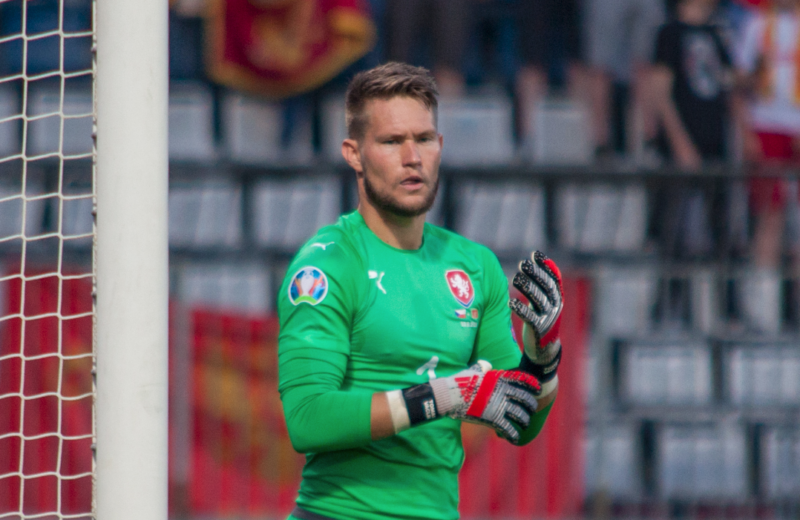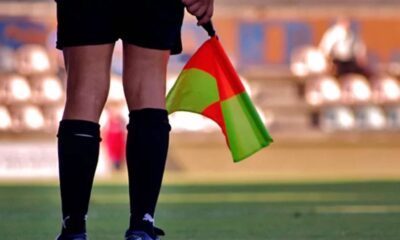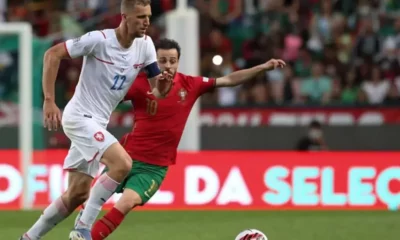Football
Vaclik played his anniversary game. Which goalkeepers have played at least 50 national team games?
The Czech national football team had a successful start to this year’s Nations League thanks to a 2-1 victory. Tomáš Vaclík also contributed to the victory over Switzerland, a participant in the upcoming World Cup, with his interventions. It was the 30-year-old goalkeeper’s 50th appearance for the national team.

The Czech national football team made a successful start to this year’s Nations League with a 2-1 victory. Tomáš Vaclík also contributed to the victory over Switzerland, a participant in the upcoming World Cup, with his interventions. It was the 30-year-old goalkeeper’s 50th appearance for the national team.
Tomáš Vaclík has joined the company of Czech and Czechoslovak goalkeeping legends who have managed to reach this milestone. Apart from Vaclik, three other successful members of the Czech senior national team have done it.
Tomáš Vaclík – 50 games
The native of Ostrava went through the Czech national teams from the under-16 category to the “twenty-one”, with whom he lost to Belarus in 2011 in the match for third place at the European Championship and for participation in the Olympics in London.
He made his debut in the “Aachen” on 14 November 2012 in a friendly match against Slovakia and kept the zero. The Czech Republic won 3:0 in Olomouc. Otherwise, Vaclik has long been in the shadow of long-time unshakable number one Petr Cech.
But after the Champions League winner retired from Chelsea, the former Sparta, Basel and Sevilla goalkeeper began to find the net more and more often. The 2018 Czech Footballer of the Year was an important part of the team’s journey to the European Championship quarter-finals last year.
Ivo Viktor – 63 matches
Ivo Viktor had an interesting debut for the Czechoslovak national team. He played for the national team for the first time on 12 June 1966 in a friendly match at the Maracanã against the home side Brazil. He was beaten twice by Pelé and the Canaries won 2-1.
A three-time league winner with Dukla, he experienced his national team peak at the memorable European Championship in Belgrade, where the Czechoslovak team enjoyed a historic triumph. It was also the reason why he finished third in the 1976 Golden Ball poll.
A year later, however, he had to retire at the age of 35 due to back problems. In his last appearance in a Czechoslovak jersey, he had to make a substitution after only two minutes on the pitch. It was on 9 November 1977, when the national team drew 1-1 with the Hungarians.
František Plánička – 73 matches
The football star of the interwar period also made over fifty starts for the national team. František Plánička was considered one of the best goalkeepers in the world not only thanks to his success with Slavia.
He contributed to one of the most significant results of our football, the second place in the 1934 World Cup in Italy. It was in this country that he made his first appearance for the Czechoslovak “A” team on 17 January 1926. The home Italians won 3:1.
Plánička played for the national team for the last time at the 1938 World Championship in France, specifically on 12 June in the first quarter-final against Brazil, which ended in a 1-1 draw. The seven-time domestic league champion died on 20 July 1996 at the age of 92.
Petr Čech – 124 matches
Petr Čech achieved his first major success as a youth player at the 2002 European Under-21 Championship. In the final of the tournament held in Switzerland, he shone in a penalty shootout against the French and celebrated the title with his teammates.
Cech made his senior national team debut in Cyprus in a match against Hungary, which Karel Brückner’s charges won 2-0. In the years to come, the Rennes, Chelsea and Arsenal goalkeeper was the clear leader in the Czech goal.
His most successful event in the national team jersey was the EURO 2004 bronze medal in Portugal. Twelve years later, he also scored for the Czech Republic at the European Championship for the last time, namely on 21 June 2016 during the 0:2 loss to Turkey in the preliminary group.
Source












